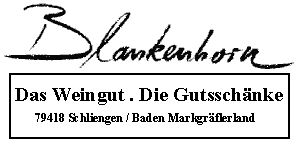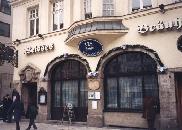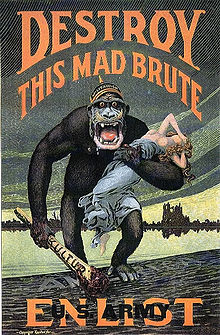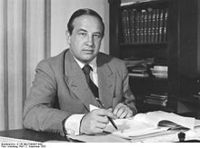Think of this as Volume 14, Number 42 of A-Clue.com, the online newsletter I've written since 1997. Enjoy.
 Here is something you weren't told in school.
Here is something you weren't told in school.
America is a Germanic country.
Our food is German. Our dress is German. Our distances, both personal and urban, are German. Our sense of beauty is German, not French. Our bread and sweets are German. Our loud laughter is German. America has people of French and Spanish and Polish and English and Irish and a hundred other descents, but the Germans set the mood, and the mood remains the same.
 Yes, there is the language. But it is easier to get along with English in today's Germany than in France. Germans also speak an American English, so there is none of that confusion over what things mean.
Yes, there is the language. But it is easier to get along with English in today's Germany than in France. Germans also speak an American English, so there is none of that confusion over what things mean.
This should not surprise. More Americans have German ancestry than any other. Many American cities, like Cincinnati, St. Louis and Milwaukee, have a heavy German influence. So do Philadelphia, Pittsburgh, Cleveland and Minneapolis. The Pennsylvania Dutch, masters of early America's cookery? The word was Deutch. Very German.
There is a reason Americans don't know this, until they find themselves in Germany and see that the bread is familiar, the wurst are just fancy hot dogs, and the schnitzel is pork-ified chicken fried steak.
It's our history.

This is where the story takes a turn. Because no nation has done so much to create modern Europe over the last 60 years as Germany. Cross into France and you will barely notice – you're not even warned by dueling rest stops. After a while the language changes on the signs. And the exits come faster.
It's a miracle Germany had a big hand in making.
Germans rebuilt their country in the 1950s, they negotiated the Common Market in the 1960s, they stood strong through the end of the Cold War in the 1980s, they rebuilt the former East Germany in the 1990s, and they have driven the EC through this last decade. Europe isn't one country by any means, but it's at peace, most of it is prosperous, and credit should go to German diplomats and businessmen.
These are values Germans and Americans need to celebrate together. The values of peace, of letting go, of getting along.
Modern German values are American values. German cities are geared to business. They are organized around commerce, like American cities. They have modern infrastructure, and a modern feel. They can also teach us a thing or two, about integrating many varieties of rail and buses into a coherent mass transit system that lets the streets stay thin and the traffic go slow. Germany is greener than America, and America needs to catch up.
Americans also need to learn things Germans learned the hard way. You don't win friends by killing people. You win friends by doing business together. Peace, man. It's groovy.
I was told here that Germans are going through a bit of soul searching these days. They're searching for their history. Some go back to Beethoven and Brahms, Goethe and Schiller. I think that's a mistake.

So if you're German-American as I am (in part, and Americans have melded to the point where most of us are many things in part *) it's time to have a little pride, make a German friend, visit Munich and Baden instead of Paris and Rome, look up your old address. Have a beer in an old-style beer hall like Weise's in Munich.
I think you'll find a home. I hope you'll make some friends.
Say thank you to them. Share your heritage with them, let them share theirs with you. Have a second beer.
They will appreciate it and you will too.
* My forefathers also came to America from Ireland, England, and Poland, and my kids can add both French and Scottish to the mix.











http://m.youtube.com/watch?v=4NAM3rIBG5k&desktop_uri=%2Fwatch%3Fv%3D4NAM3rIBG5k
http://m.youtube.com/watch?v=4NAM3rIBG5k&desktop_uri=%2Fwatch%3Fv%3D4NAM3rIBG5k
English is Germanic language.
English is Germanic language.
Are speaking of the entire United States? Because some regions such as the midwest and east coast feel Germanic, but the western front of the US such as California and Nevada do not feel as such and rather more southern European.
Are speaking of the entire United States? Because some regions such as the midwest and east coast feel Germanic, but the western front of the US such as California and Nevada do not feel as such and rather more southern European.